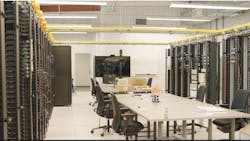SRP's Utility Technology Innovation Laboratory Becomes Fully Operational
Cross-department collaboration, technician and engineer training, tabletop exercises and state-of-the art utility technology testing are some of the value-added capabilities SRP has as part of its new Technology Innovation Laboratory in Scottsdale. Developments coming out of the lab are expected to improve power reliability by focusing on technology that enhances aging infrastructure and results in fewer and shorter customer outages.
The construction of the lab was completed in summer 2020 and it became fully operational in April 2021. When the pandemic-related restrictions are lifted, the lab will be able to accommodate up to 72 people at any given time. The 5400 sq. ft., lab is modeled on SRP’s control house at its Kyrene 230kV Substation. Perforated interior walls and ceiling panels to dampen sound, interior lighting color and intensity to reduce eye fatigue, and windows to let in natural light are some design elements used in the lab to make it conducive for everyday work.
“It is such a tremendous development because three of SRP’s disparate labs melded together to become one cooperative space with so much more functionality,” said Kyle Cormier, Director of Telecommunication Systems, SRP. “Separation can stifle opportunity to find efficiencies. Working together, researching and testing new solutions means we will come to realizations quicker, find improved ways to communicate and ultimately enhance SRP’s system reliability.”
The lab provides a combined space for SRP employees and contractors who work across a number of its power operation functions with key departments, including Telecom Systems; Distribution Integration; Distribution Operations; Protection, Automation & Control; Power Delivery Engineering; and Power Delivery Technology Services.
“The lab will support the day-to-day activities of these teams as well as longer-term testing, proof of concept and vendor evaluation efforts of new software and hardware solutions to see firsthand how these will work in an isolated environment before fully deploying across SRP’s system,” said Tait Willis, Director of Protection, Automation & Control, SRP.
SRP’s Protection, Automation & Control department has begun working in the lab with Intel and other partner utilities to explore the feasibility of virtualizing substation systems into a standardized server. There is a first-generation prototype installed at the Technology Innovation Lab where groups involved are in the early testing phase to determine potential advantages compared with hardware-based systems. Developing and ultimately deploying a virtualized solution would help standardize the hardware platform, consolidate and centralize functionality, improve employee safety, reduce capital investment, and reduce operation and maintenance costs.
SRP’s Telecom Engineering team has begun testing firmware for the Field Area Network (FAN) Tier 2 radios to improve two-way communication for connected devices. This testing will help determine if new firmware solutions improve communication with SRP’s devices in hard-to-reach areas as power utilities must receive updates from all control and sensing devices, including those within the distribution system. Reliable communication to control and sensing devices enables advanced functionality and increased situational awareness of the power system. This functionality and increased awareness benefit SRP customers through increased power reliability and power quality.
“Our goal in this testing is to ensure telecom network capability, reliability and security for all connected devices,” said Cormier. “We constantly strive to find solutions that help us better communicate with our mission-critical assets which keep power turned on for customers.”
Building a comprehensive lab that combines teams and processes was a concept that started nearly a decade ago at SRP. From start to completion, the Technology Innovation Lab took nearly three years to plan, construct and cultivate. It has workspace areas for engineers to test solutions, collaborative team spaces for research and development, and space for configuring or staging equipment prior to field deployment. The lab also has a small classroom space where vendors and SRP teams can conduct training among engineers and technicians.
“Training is a huge area of focus for this lab space,” said Willis. “With evolving technologies and standards and to adequately develop SRP’s engineers and technicians, we needed a central space where employees can come to learn maintenance and commissioning practices in a safe environment. The lab will also act as a facility to simulate capabilities to test performance, troubleshoot problems, meet compliance requirements and perform cyber testing.”
Understanding the broad use of the lab space, a governance structure was created that includes executive sponsorship, a steering committee, business teams and an employee that acts as lab custodian. These teams were instrumental in the design and implementation of the lab and this continued framework helps with decision making, communication and ensuring users have common expectations working in a shared space.
“The lab is a flexible space for SRP employees and partners to innovate and collaborate across user groups to meet current and future needs, and most importantly, improve reliability across SRP’s system,” said Willis. “We look forward to seeing the lab function at full capacity and see how our entire organization benefits from the research and development SRP will be able to perform as well as improved training practices that employees will be able to build a foundation from.”
